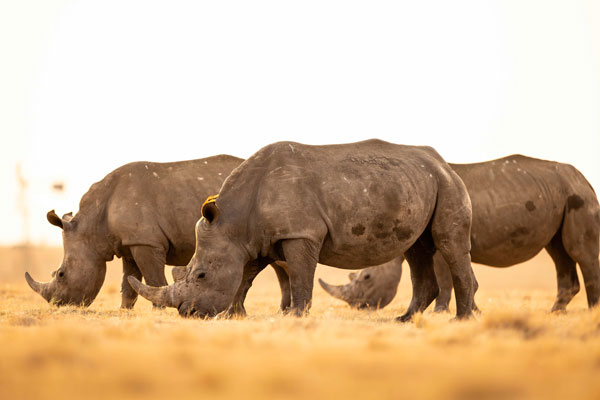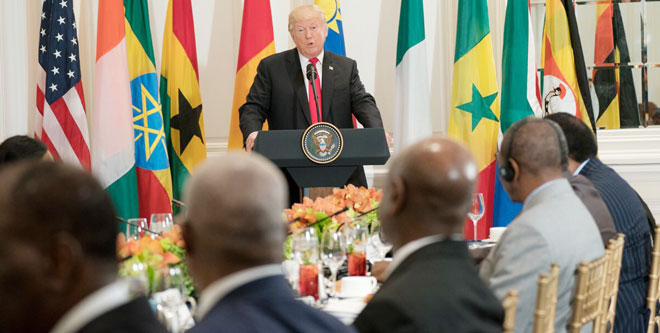
2000 southern white rhinos are set to be introduced to parks and reserves across the continent over the next decade, after being rescued by an NGO – part of an ambitious rewilding project.
SPECIAL REPORT | BIRD AGENCY | After a failed rhino farming business left 2000 southern white rhinos in danger, an African game park specialist has stepped in to assist. African Parks will “re-wild” the rhinos, according to Peter Fearnhead, the organisation’s CEO.
“We will be working with multiple governments, funding partners, and conservation organizations that are committed to making this rewilding vision a reality,” Fearnhead said in a statement.
Previously under the care of South African entrepreneur John Hume on a 7800-hectare property, Platinum Rhino, the rhinos were put at risk when Hume ran out of money. Hume, who has said he spent US$150 million on the project, was no longer able to provide the over US$400,000 per-month running costs of the operation.
Efforts to put the facility up for auction in April 2023 were unsuccessful and the rhinos were increasingly at risk, until African Parks stepped in with a solution – an ambitious plan to move the animals to parks and reserves across the continent, where rhinos have been wiped out by human activities.
“The scale of this undertaking is enormous, and therefore daunting. However, it is equally one of the most exciting and globally strategic conservation opportunities,” Fearnhead said.
African Parks, which manages 22 protected areas in collaboration with 12 African governments, has taken over ownership of the facility with plans to oversee the rewilding process for the next decade.
Rewilding involves the reintroduction of specific, “keystone” species to enhance ecosystems and counteract biodiversity loss.
Rhinos are regarded as a keystone species in most African wild habitats. In many areas, they have gone extinct and reintroducing rhinos is expected to have a beneficial impact on biodiversity, allowing numerous species that rely on their presence, to flourish.
Historically, white rhinos consisted of two subspecies – southern white and northern white. The northern white rhino is functionally extinct, with only two non-breeding females in captivity in Kenya.
While the southern white rhino rebounded from an all-time low of 30 to 40 animals in the 1930s to approximately 20,000 by 2012, illegal wildlife trade and poaching have since reduced their numbers to below 16,000, according to 2021 data from the International Union for Conservation of Nature (IUCN).
Southern white rhinos continue to face severe threats, particularly from poaching. In a report from August 2023, South Africa’s Minister of Forestry, Fisheries, and Environment, Barbara Creecy, revealed that 231 rhinos were killed in the first half of 2023 reaffirming the threat these species face, according to the statement from African Parks.
News24.com reports that Creecy congratulated African Parks on the acquisition, saying it was a “conservation solution for the rhino currently in a captive facility”.
“Our government is guided in our approach to conservation by the UN Convention on Biodiversity and our own white paper. In this regard, we are ready to support African Parks and other partners with technical and scientific advice in developing a conservation solution that includes translocating the animals over a period of time to suitable parks and community conservancies in South Africa and on the African continent,” the News24 report quoted Creecy as saying.
According to African Parks, Platinum Rhino currently houses rhinos in individually fenced dual-camp areas, providing supplementary feed for 48% of their annual dietary needs, while natural grazing accounts for the remaining 52%.
The rewilding program promises not only a cost-effective habitat but also an ideal environment for the rhinos’ survival and the overall ecosystem.
As Mike Knight, Chairman of the IUCN African Rhino Specialist Group, emphasizes, “This initiative offers a unique opportunity to rewild these 2000 rhinos for the benefit of both people and rhino conservation in Africa.”
Africa has witnessed successful rewilding programs in the past. The number of critically endangered Mountain Bongos in the Mt Kenya Wildlife Conservancy, where 18 individuals were introduced to the area from 2004, has now reached 68, with the number expected to reach over 700 by 2050
The Peace Parks Foundation rewilded 40 rhinos in Zinave National Park in Mozambique after a 40-year absence while similar initiatives have restored animal populations in Rwanda’s Akagera National Park, South Africa’s Great Karoo, and other regions.
However, beyond conservation, a 2023 study published in the Nature Climate Change Journal highlights rewilding as a vital tool for Earth’s restoration and natural climate solutions.
******
SOURCE: bird story agency
 The Independent Uganda: You get the Truth we Pay the Price
The Independent Uganda: You get the Truth we Pay the Price



